The Indigenous elder hoping for an apology from the pope
A survivor of Canada’s residential schools is on a mission to get the Catholic Church to apologise for its role in them.
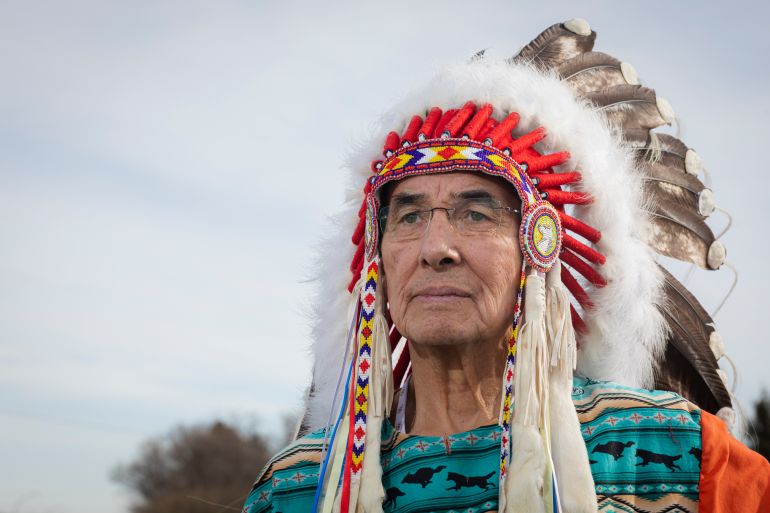
Warning: The story below contains details of residential schools that may be upsetting. Canada’s Indian Residential School Survivors and Family Crisis Line is available 24 hours a day at 1-866-925-4419.
Alberta, Canada – Thumbing through a binder of photographs and mementos gathered during the course of his lifetime, Dr Wilton Littlechild stops to trace the lines of a pencil drawing with his finger. It is a sketch of Pope Pius XII that he drew almost 60 years ago when he attended a residential school.
Keep reading
list of 4 itemsHolding Up the Sky: Saving the Indigenous Yanomami tribe in Brazil’s Amazon
Indigenous people in Philippines’s north ‘ready to fight’ as tensions rise
Curfew announced for under-18s in Australia’s Alice Springs after unrest
The 77-year-old wonders aloud why he would have chosen to draw the pope when he was in 12th grade.
“This is a part of the journey,” he reflects. “Now, it’s kind of coming together.”
Littlechild is in his home in the Ermineskin Cree Nation in Maskwacis, central Alberta, but he is preparing to travel to Rome as part of a delegation of First Nations, Inuit and Metis residential school survivors who will meet with Pope Francis.
Church and state-run residential schools operated in Canada from the late 1800s until 1996 with the goal of forcibly assimilating Indigenous children into the mainstream European culture. Around 150,000 Indigenous children were taken from their parents and communities and forced to attend the schools, where abuse – verbal, physical, sexual, spiritual and emotional – was rampant and Indigenous languages and cultural practices were banned. There were 139 such schools across Canada and the Catholic Church oversaw 60 percent of them.
Now, Littlechild is hopeful that the pope will apologise for the role the Church played.
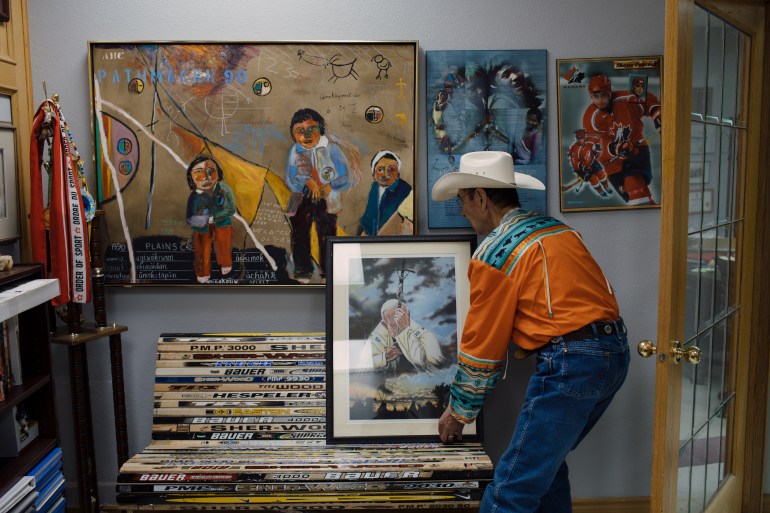
“I like him,” he says of Pope Francis. “When he was presenting his first speech, if you closed your eyes, you would have thought he was an Indigenous elder because of his concern for the environment, for climate change.
“[I thought] ‘wow’. He was concerned about the animals that need to be protected, you know. I thought to myself now this guy may be the guy that’ll apologise.”
For almost two decades, Littlechild, a lawyer and former member of Parliament, has advocated for the head of the Catholic Church to apologise. It is a subject that is very close to his heart.
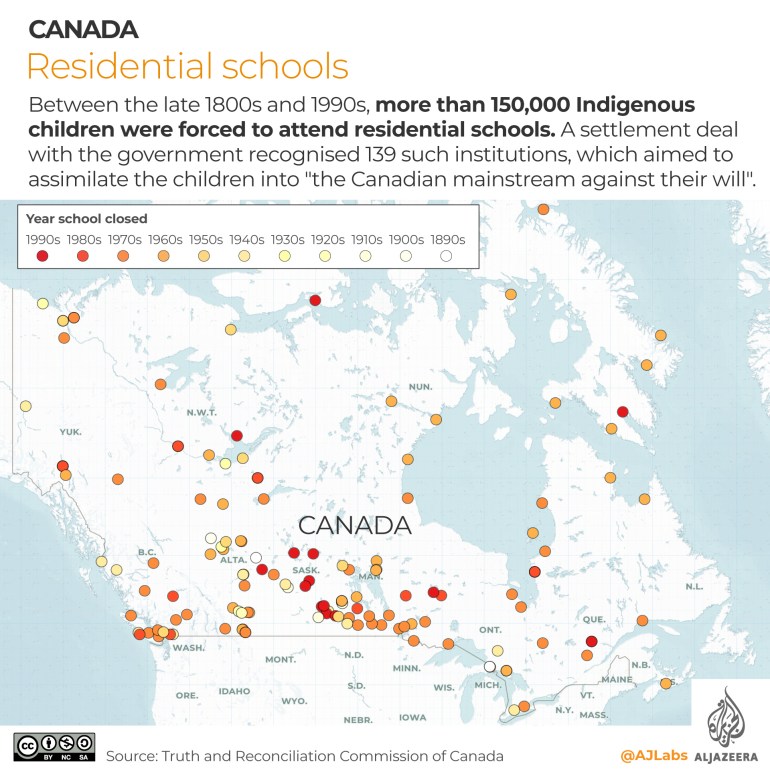
‘Number 65’
Littlechild’s parents were residential school survivors. The trauma it inflicted upon them meant that they were unable to raise their children. So Littlechild lived with his grandparents. It was from them that he was taken when he was just six years old – forced like his parents before him to attend a residential school.
At the Ermineskin Residential School, he was given a uniform and had his name taken from him – he would, instead, be known as number 65.
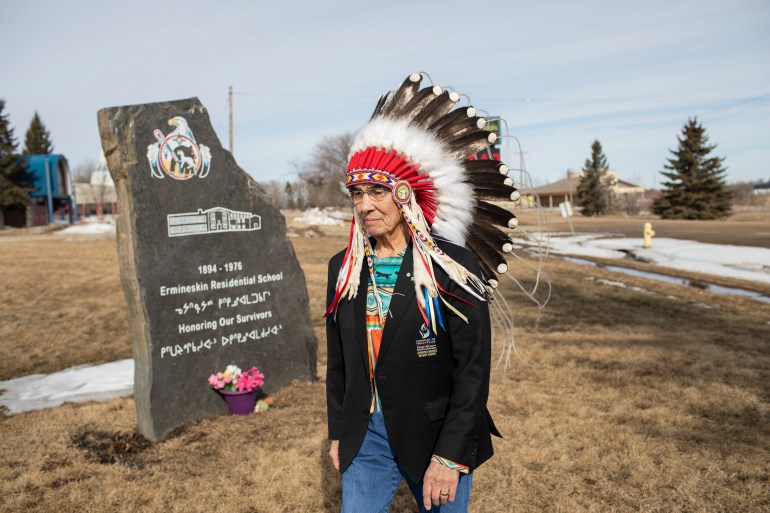
He stayed there until 9th grade, when he was transferred to another residential school in Edmonton.
“All of the abuses you hear about, I went through them all,” he says dryly.
His siblings – seven sisters and four brothers – attended the same residential schools but, he says sorrowfully, they were like strangers to one another.
“As far as emotions of love, or basically any human emotion, you did not experience them in the institution,” he explains, a pained expression on his face. “You don’t know anything about it [love]. For example, I spent 11 years with them [his siblings] in that building, but I don’t know them as sisters or brothers. Do you know what I mean? There’s no familial bond, but we’ve been working on it.”
‘A prison. For children’
He flips to a black-and-white photo in the binder. It is of the Ermineskin Residential School in the late 1950s.
“You see this?” he points to what looks like a barbed-wire fence in front of the school. “What people don’t know … they always say to me ‘Why can’t you just get over this?’ Well, this is an electric fence. That’s how they kept me and my friends in. When you look at this picture, it looks like a compound. I mean how different is it from a prison? For children.”
He describes how he found a way to get around the electric fence and how, after dusk every night, he would go running. Athletics, he says, helped save his life.
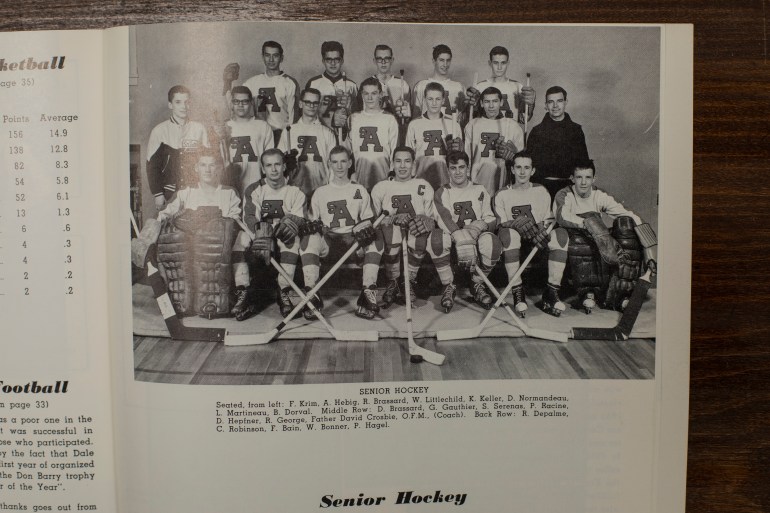
It wasn’t the only thing he excelled at – Littlechild played other sports, was gifted in the arts and was an honour student who won various academic and sporting awards. Hockey, though, was his true passion – and the one that helped him survive the horrors he endured at the residential school.
When he left the school, Littechild studied physical education and then law, but he still harboured an ambition to become a professional hockey player. That dream was shattered when he broke his leg in his 20s. So he focused on becoming a lawyer.
‘6,500 stories of abuse’
His career would lead him to the UN, as part of a delegation that helped write the United Nations Declaration on the Rights of Indigenous Peoples, and into politics as, from 1988 to 1993, he served as a member of Parliament. In 1993, he was awarded the Order of Canada.
Littlechild was in the House of Commons in Ottawa in June 2008 when then Canadian Prime Minister Stephen Harper apologised to residential school survivors and all Indigenous people in Canada on behalf of the Canadian government. Littlechild says he walked over to Harper afterwards, shook his hand and thanked him.
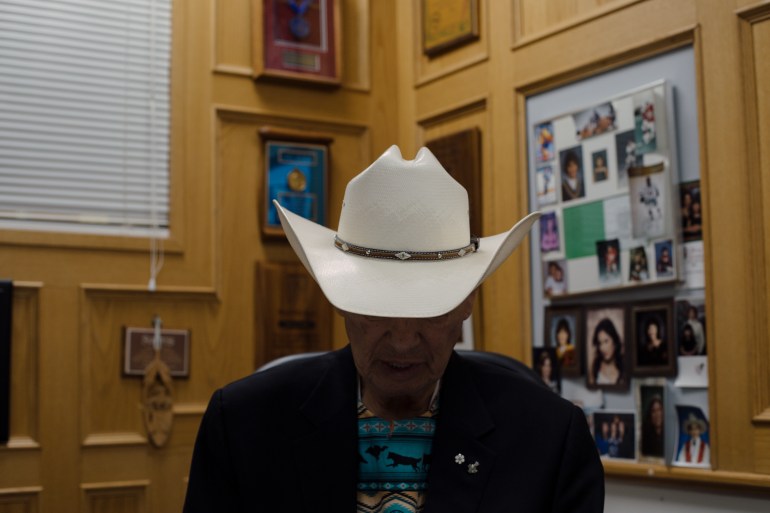
In the same year, the government established the Truth and Reconciliation Commission of Canada (TRC) to document the legacy of the residential schools and to hear from those affected by them. Littlechild became a commissioner for the TRC, travelling across the country, listening to the more than 6,500 people who came forward to share their accounts. In December 2015, the TRC released its final report with 94 “calls to action” on reconciliation between Canadians and Indigenous Peoples.
“When they first asked me to be a commissioner, I didn’t want to do it,” says Littlechild. “Because residential school really impacted me emotionally. But now, after going through it, I’m so thankful that I did it. It took a lot of heavy counselling to debrief after every day [of the meetings of the TRC]. Because I was re-reliving my life, re-traumatising myself by listening to over 6,500 stories of abuse.”
He remembers consistently hearing from survivors that they wanted an apology from the Catholic Church.
“We heard so many times from people who were in pain, in anger, sometimes through tears, saying to us, ‘All I want is an apology. All I want is someone to say to me, after all, we were only children, to say to me, I’m sorry for what we did to you.’ And that stayed in my head. An apology gives an opportunity to forgive. That’s a part of healing. I think many people have done a good job healing themselves. But I think that we’re still missing a piece,” he reflects.
‘They want to hear ‘I’m sorry”
Several years ago Littlechild participated in a repatriation ceremony for 16 children from his home community who had died at residential schools in Red Deer, Alberta. The children were given traditional burials and honoured in ceremonial feasts held over four years. Their remains were transported to their gravesites in pine boxes; many of them didn’t have a name to be buried with.
Littlechild says he volunteered to carry a box with the remains of a six-year-old boy inside. “There was no name. But I carried him because he was the same age as me when I went to residential school … it could’ve been me.” He moves both hands toward his heart and takes a deep breath.
Last summer, thousands of unmarked graves of children who died at residential schools were found. The search for others is ongoing. Littlechild volunteered to help in searching the former grounds of the Ermineskin Residential School.
Despite his age, he pushed ground-penetrating radar equipment around the open field next to the community’s official cemetery last fall. As he did so, memories of his time at the school returned to him. It was a difficult experience, but he felt compelled to participate.
“I was hoping, ‘Oh please God, don’t let me find anyone, any child that was buried here’,” he says.
Maskwacis has not yet released the findings from the search.
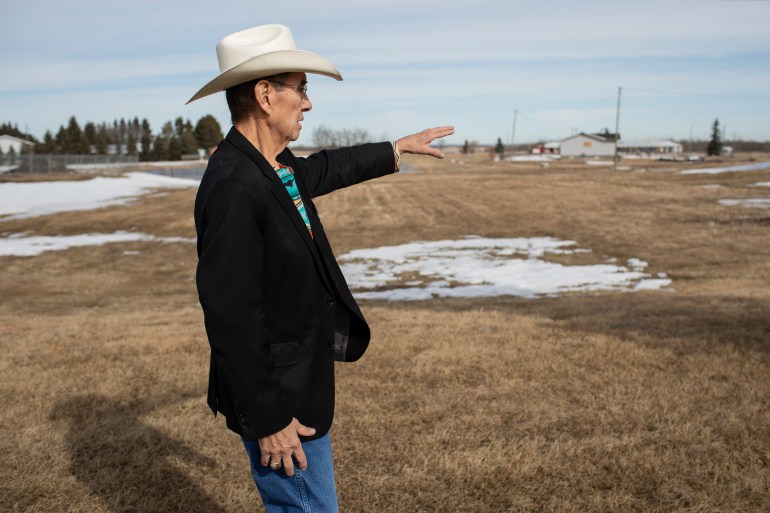
The Anglican, United and Presbyterian Churches have all issued apologies for the roles they played in Canada’s residential schools. Since the unmarked graves were found last summer, pressure has mounted on the Catholic Church to do the same.
Littlechild and a small number of other First Nation delegates will participate in an hour-long private meeting with Pope Francis on March 31. The pope will have separate meetings with Inuit and Metis delegates in Rome and then hold a general audience at the Vatican on April 1.
Asking for an apology is at the top of Littlechild’s list of priorities for the meeting.
“[What I’m going to say to Pope Francis] is ‘My plea to you is come to Canada and give the apology. The three words that my people want to hear: ‘I am sorry.’ And the trigger [for healing] is going to be the apology. If he says ‘yes’, while we’re there and expects us to bring the apology home, it won’t work. Because the people that I heard in front of me were in tears and pain and anger and different emotions, they want to hear him say to them, ‘I’m sorry’.”
Littlechild explains, “All of this is important for self-identity, self-esteem, because many, many of our children are still lost. They don’t know who they are because they don’t know their language anymore. I’m lucky, I can still speak my language [Cree]. They didn’t beat that out of me.”
Time is running out
In a statement released on March 24, the Canadian Conference of Catholic Bishops (CCCB) said it is “grateful” to the Indigenous delegates and to Pope Francis for his attention to the suffering of residential school survivors.
“We expect that these private encounters will allow the Holy Father to meaningfully address both the ongoing trauma and legacy of suffering faced by Indigenous Peoples to this day, as well as the role of the Catholic Church in the residential school system, which contributed to the suppression of Indigenous languages, culture and spirituality,” said CCCB President Bishop Raymond Poisson.
But time is running out for remaining survivors, says Littlechild. He estimates that up to four residential school survivors are passing away every day in Canada.
“So those people went to their grave never having had an apology for what was done to them as children,” he says.
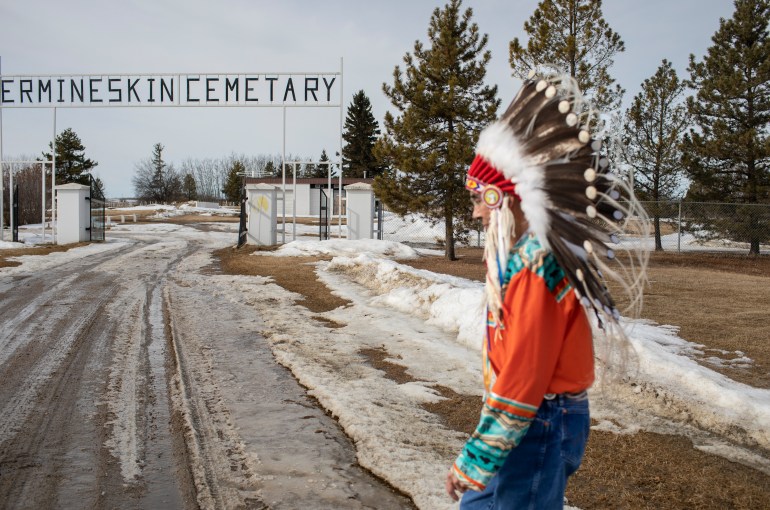
He also plans to share with the pope the impact sport has had on his life and his belief that it can be utilised to heal native communities. Littlechild says he is contemplating giving a football jersey to the pope because he has heard he enjoys the game.
“For me, residential school was such a bad experience and sports was my only way out. I’m going to call on Pope Francis to encourage our youth to pursue a balance in sports – it helps you to focus on your physical, mental, cultural and spiritual elements of life,” he says.
The third request he has for the pope is for the Catholic Church to adopt the 10 principles for truth and reconciliation he helped to create during his time with the TRC.
This isn’t the first time Littlechild has travelled to Rome. He has been there half a dozen times before and has previously met with Pope John Paul II and Pope Benedict XVI. None of those meetings resulted in an apology.
“So, how do we move forward with reconciliation?” he asks. “Once you’ve had the apology you have an opportunity to forgive. I think that piece is still missing and that’s why our communities are still hurting. Then, with an apology, people will begin to feel a sense of healing. And once that happens a new emotion originates – a sense of justice. To say ‘Yes, wrong was done to me. I’m forgiving now and going to heal and I feel justice has been done.’”